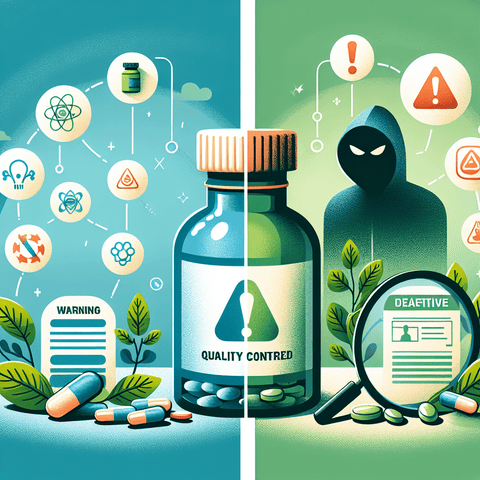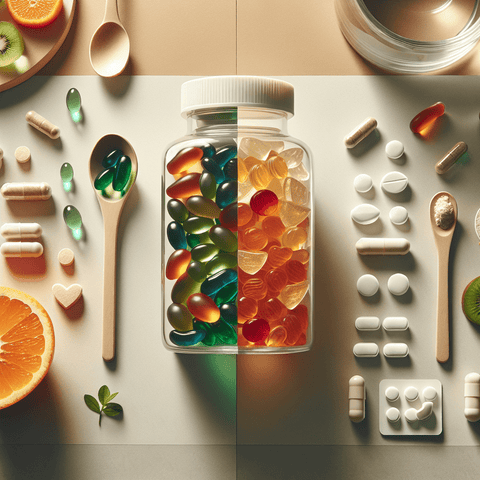Introduction
The nutritional supplements market is booming—with more people than ever turning to vitamins, minerals, herbs, and other compounds to support overall health and wellness. While this increasing demand opens doors to innovation in preventive health, it also creates a crowded marketplace where the quality of supplements varies dramatically. With a simple online search yielding thousands of different products, how can the average health-conscious individual separate the top-tier supplements from low-grade, ineffective alternatives?
Choosing the right supplement is not just about picking a product with the most appealing packaging. A supplement’s quality affects its purity, efficacy, and safety. Poor-quality products may contain improper dosages, unapproved ingredients, or even harmful contaminants such as heavy metals and solvents. Furthermore, misleading labels and aggressive marketing tactics can trick even the most well-informed consumer into making a choice that offers little benefit and may even be detrimental to their health.
The purpose of this blog post is to help you purchase with confidence. You’ll learn how to identify high-quality supplements using expert-backed guidance, safety standards, and common-sense comparisons. We’ll cover what defines a high-quality supplement, how to read and interpret labels, which certifications and tests matter, what ingredients to seek or avoid, and how to identify brands you can trust. In today's piece, we aim to translate technical industry knowledge into clear, user-friendly advice that empowers you to make safer and smarter supplement decisions.
By mastering the insights outlined here, you'll avoid poorly manufactured, underperforming products and instead learn to spot premium, third-party-tested, clean-label supplements made by transparent and reputable brands. We’ll end with a checklist for smart shopping—and link you directly to trusted collections available at Topvitamine.com.
What Are High-Quality Supplements and Why They Matter in Nutritional Supplementation
To accurately assess the value of a supplement, we first need to define what sets a high-quality supplement apart. High-quality supplements are well-formulated, safe, and effective. They contain transparent, scientifically supported ingredients delivered in optimal forms and dosages that the human body can absorb and utilize efficiently. These supplements are manufactured in facilities adhering to strict quality standards and are often verified by independent third-party testers to ensure purity and accuracy.
Low-quality supplements, by contrast, might use cheap filler ingredients, contain fewer active components than claimed, or be contaminated with residues from poor manufacturing practices. These products may skip third-party testing entirely and use vague proprietary blend listings to obscure what's actually inside the capsule, gummy, or powder. Many contain synthetic additives, artificial colors, unnecessary preservatives or allergens that provide no added benefit—and in some cases, work against the intended health supports.
The consequences of using substandard supplements can be real. In recent years, media investigations and peer-reviewed studies have revealed alarming inconsistencies among products on the shelf. For example, a 2015 study by the New York Attorney General’s office found that four out of five supplements tested at major retailers contained none of the herbs listed on their labels. Worse, they sometimes contained unlabeled fillers like wheat and rice, posing risks for allergic consumers.
On the flip side, a properly formulated magnesium supplement using bioavailable forms such as magnesium glycinate or magnesium citrate—and one that’s properly tested and verified—allows consumers to confidently support energy metabolism, muscle function, and bone health. Find reliable magnesium products in the magnesium collection on Topvitamine.com.
Recognizing the differences between reliable and unreliable products can drastically improve the effectiveness of your supplementation regimen while also minimizing unwanted exposures. Ultimately, high-quality supplementation is not about following trends or chasing exotic ingredients—it's about product integrity, sourcing, safety testing, and label clarity.
How Premium Dietary Supplements Deliver Better Results for Your Health
So what exactly distinguishes a premium dietary supplement? Fundamentally, premium products meet the highest standards of ingredient quality, bioavailability (i.e., how well the body absorbs and utilizes a nutrient), potency, and formulation science. They also avoid the use of non-essential excipients unless necessary for stability—and even then, use safer alternatives. This typically warrants a higher price point, but the value it delivers in terms of health outcomes can far outweigh the initial cost.
A true premium supplement contains carefully sourced ingredients. For example, the vitamin D3 derived from lanolin (from sheep’s wool) is more comparable to the vitamin D the human body synthesizes through sun exposure. You can find carefully curated products in the vitamin D supplement collection at Topvitamine, all featuring known sourcing methods and stability-enhancing delivery systems such as softgels for oil-based nutrients.
Another feature of premium supplements is bioavailability. Forms such as methylcobalamin (for B12), chelated minerals (such as magnesium bisglycinate), and liposomal vitamin C are all selected specifically because they are absorbed more efficiently than standard forms like cyanocobalamin, magnesium oxide, or ascorbic acid alone. Cheaper products often deliver nutrients in less absorbable or unstable forms, reducing the actual benefit you receive despite correct labeling.
Additionally, premium dietary supplements frequently feature patented ingredients supported by clinical studies. This includes formulations like Meriva® curcumin (a turmeric extract with improved absorption) or Kaneka Ubiquinol (a stable CoQ10 form). These ingredients cost more but are often justified through human research, unlike generic counterparts.
The higher price of premium supplements also reflects investments in manufacturing technologies, testing, and responsibly sourced ingredients. It’s the difference between settling for synthetic vitamin E as DL-alpha tocopherol vs. natural D-alpha tocopherol with mixed tocopherols for a full-spectrum antioxidant formulation. Again, you can browse our curated collection of vitamin C supplements at Topvitamine.com to see premium formulations firsthand.
While not every supplement in your regimen needs to be top-shelf, investing in premium options for cornerstone nutrients—like omega-3 fatty acids, magnesium, and fat-soluble vitamins—often pays off in the form of better tolerance, enhanced absorption, and peace of mind regarding safety.
The Importance of Third-Party Tested Supplements: Independent Verification You Can Trust
Third-party testing is one of the most reliable indicators of supplement quality—and arguably the single most important. When a supplement is tested by an independent laboratory unaffiliated with the manufacturer, it confirms that the product meets label claims and is free from unsafe contaminants such as heavy metals, mold, solvents, microbes, and pesticides. Given that regulatory oversight in the nutritional supplement sector varies by country and region, third-party testing provides an essential layer of accountability.
Respected third-party verification bodies include USP (U.S. Pharmacopeia), NSF International (especially important for athletic products), ConsumerLab, Eurofins, and BSCG (Banned Substances Control Group). Their rigorous assessments go above and beyond minimal legal requirements to confirm safety, label accuracy, and ingredient purity. A supplement displaying one or more of these certifications gives you concrete evidence of its legitimacy.
For example, USP verification not only confirms that the ingredients listed are present in the dosages claimed but also ensures that the product dissolves in accordance with pharmaceutical standards—critical for bioavailability. NSF also includes testing for contaminants and ensures that manufacturing facilities meet Good Manufacturing Practice (GMP) requirements.
Unfortunately, many companies either conduct only in-house testing—giving them full control of the process—or forego testing altogether. Such products may make ambitious health claims without showing any external validation. This is a major red flag, especially when dealing with supplements for cardiovascular or immune support (where dosage and purity are critical).
To find evidence of third-party testing, examine the product packaging or visit the brand’s official site. On Topvitamine.com, we prioritize supplements that are independently tested. You’ll find reliable, third-party-tested omega-3 formulations in our omega-3 supplement section, including DHA/EPA products free from contaminants and registered in high-quality labs.
Ultimately, third-party testing builds consumer trust. A supplement brand that willingly subjects its products to independent scrutiny sends a powerful message about its commitment to your health and transparency.
Why Clean Label Supplements Are a Game-Changer for Health-Conscious Consumers
The clean label movement emphasizes transparency and the elimination of unnecessary synthetic additives in supplement production. Consumers who seek clean label supplements are not only looking for efficacy in the active ingredients but also want to ensure they’re not ingesting potentially harmful or allergenic fillers, dyes, or preservatives.
Common additives to avoid include titanium dioxide (used often as a whitening agent with limited safety data on inhalation and ingestion), magnesium stearate (used as a flow agent, but controversial in high doses), hydrogenated oils, artificial sweeteners like aspartame or sucralose, and artificial colors. While these ingredients aren’t banned outright, they’re increasingly viewed as unnecessary and potentially problematic, especially for sensitive populations, including children, pregnant women, and individuals with autoimmune or gastrointestinal issues.
Clean label supplements often carry additional certifications, indicating compliance with dietary preferences or restrictions. Common certifications include Non-GMO Project Verified, USDA Organic, Gluten-Free, Vegan, and Allergen-Free. Look for these badges clearly printed on the front or back label packaging or called out in product descriptions.
To interpret supplement labels through a clean-label lens, consider the totality of the ingredients list. Is there a long list of substances with chemical-sounding names that don’t support the main active ingredient? A short, concise ingredients list with high-quality excipients such as rice flour, pullulan (a natural capsule), or ascorbyl palmitate as an antioxidant is often preferred.
Understanding clean label principles helps consumers avoid cumulative exposure to food-grade chemicals. At Topvitamine.com, our curated selection—especially in the vitamin K collection—features several clean-label options, ensuring your supplements support well-being without unwanted additives.
In essence, clean label supplements are easier to digest—both figuratively and literally—and are increasingly viewed as the gold standard by practitioners and integrative medicine experts.



